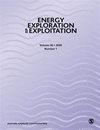Combined emission economic dispatch using quantum-inspired particle swarm optimization and its variants
IF 1.6
4区 工程技术
Q4 ENERGY & FUELS
引用次数: 0
Abstract
The ever-increasing electricity demand, its dependency on fossil fuels, and the consequent environmental degradation are major concerns of this era. The worldwide domination of fossil fuels in bulk electricity generation is rapidly increasing the emissions of CO[Formula: see text] and other environmentally dangerous gases that are contributing to climate change. The economic and emission dispatch are two important problems in thermal power generation whose combination produces a complex highly constrained nonlinear optimization problem known as combined economic and emission dispatch. The optimization of combined economic and emission dispatch aims to allocate the generation of committed units to minimize fuel cost and emissions, simultaneously while honoring all equality and inequality constraints. Therefore, in this article, we investigate a solution of the combined economic and emission dispatch problem using quantum particle swarm optimization and its two modified versions, that is, enhanced quantum particle swarm optimization and quantum particle swarm optimization integrated with weighted mean personal best and adaptive local attractor. The enhanced quantum particle swarm optimization algorithm achieves particles’ diversification at early stages and shows good performance in local search at later stages. The quantum particle swarm optimization integrated with weighted mean personal best and adaptive local attractor boosts search performance of quantum particle swarm optimization and attains better global optimality. The suggested methods are employed to achieve solution for the combined economic and emission dispatch in four distinct systems, encompassing two scenarios with 6 units each, one with a 10-unit configuration, and another with an 11-unit setup. A comparative analysis with methodologies documented in existing literature reveals that the proposed approach outperforms others, demonstrating superior computational performance and robust efficiency.利用量子启发粒子群优化及其变体实现联合排放经济调度
不断增长的电力需求、对化石燃料的依赖以及随之而来的环境退化是当今时代的主要问题。化石燃料在全球大宗发电中的主导地位正在迅速增加二氧化碳[公式:见正文]和其他环境危害气体的排放量,从而导致气候变化。经济调度和排放调度是火力发电中的两个重要问题,它们的结合产生了一个复杂的高约束非线性优化问题,即综合经济调度和排放调度。综合经济调度和排放调度的优化目标是分配承诺机组的发电量,使燃料成本和排放同时最小化,同时遵守所有平等和不平等约束。因此,本文研究了利用量子粒子群优化及其两个改进版本,即增强型量子粒子群优化和集成了加权平均个人最佳和自适应局部吸引子的量子粒子群优化来解决经济与排放联合调度问题。增强型量子粒子群优化算法在早期阶段实现了粒子的多样化,并在后期阶段表现出良好的局部搜索性能。量子粒子群优化算法集成了加权平均个人最优和自适应局部吸引子,提高了量子粒子群优化算法的搜索性能,并获得了更好的全局最优性。所建议的方法被用于实现四个不同系统的经济和排放综合调度解决方案,其中包括两个各有 6 台机组的方案、一个有 10 台机组配置的方案和另一个有 11 台机组配置的方案。通过与现有文献中的方法进行比较分析,发现所提出的方法优于其他方法,显示出卓越的计算性能和稳健的效率。
本文章由计算机程序翻译,如有差异,请以英文原文为准。
求助全文
约1分钟内获得全文
求助全文
来源期刊

Energy Exploration & Exploitation
工程技术-能源与燃料
CiteScore
5.40
自引率
3.70%
发文量
78
审稿时长
3.9 months
期刊介绍:
Energy Exploration & Exploitation is a peer-reviewed, open access journal that provides up-to-date, informative reviews and original articles on important issues in the exploration, exploitation, use and economics of the world’s energy resources.
 求助内容:
求助内容: 应助结果提醒方式:
应助结果提醒方式:


